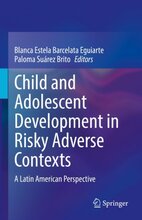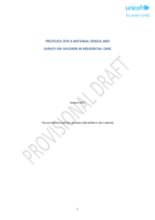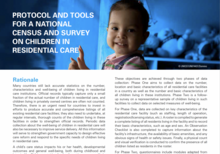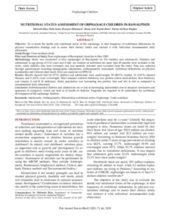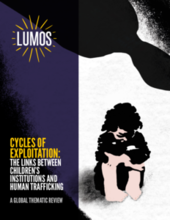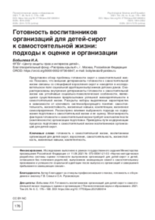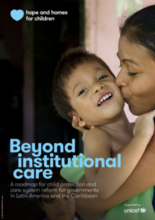Displaying 141 - 150 of 771
The causes of institutionalization are multiple and the impact it causes is reflected in different areas such as the development of the child in general, such as mental, psychic structuring, health, and nutrition. Psychologically, children present alterations in their cognitive, emotional, sexual, and social domains with a high probability of developing several pathological conditions. This chapter presents an overview of this phenomenon based on several research investigations carried out in Spain, Latin America, and Mexico.
This protocol for data collection on children living in residential care facilities (RCFs) aims to provide governments with clear guidance on recommended actions and steps for undertaking a census to map and enumerate such facilities and the children living in them.
The Data and Analytics Section at UNICEF Headquarters developed a data collection protocol and tools for conducting a census of residential care facilities, the enumeration of children, and a survey of child well-being that can be replicated and adapted in a variety of country contexts.
This is an ethical framework to guide engagement with tamariki (children) and rangatahi (young people) who are care experienced (that is, who currently or at some stage in their lives have been in foster or residential care).
The objective of the study was to evaluate the health and nutritional status of four registered orphanages of Rawalpindi, to find frequency of nutritional deficiencies by physical examination findings and to assess their dietary intake and contrast it with individual recommended daily allowances.
Watch the launch of a ground-breaking report: Cycles of Exploitation: The Links Between Children’s Institutions and Human Trafficking. The report makes recommendations for breaking the complex cycles of exploitation that trap children and let traffickers go free.
This Global Thematic Review examines the growing evidence of the links between the institutionalisation of children and human trafficking. It highlights how the relationship between the two compounds the harmful nature of both phenomena and offers insight into the global response needed.
Представлен обзор проблемы готовности сирот к самостоятельной жизни. Показано, что внешние детерминанты готовности к самостоятельной жизни связаны со спецификой взросления сирот и находятся в исследовательском поле социальной адаптации выпускников детских домов.
Low readiness for independent living is what underlies the problems of social adaptation in children and adolescents from orphan organizations. This review explores how scientists and practitioners interpret this very concept of readiness for independent living.
This report provides a framework for governments to develop their own roadmap for child protection and care system reform and deinstitutionalisation. The authors hope that it will inspire a conversation, guide inter-ministerial and cross society dialogue, support multidisciplinary groups at all levels to frame their own assessment, and plan their own roadmap for change.

